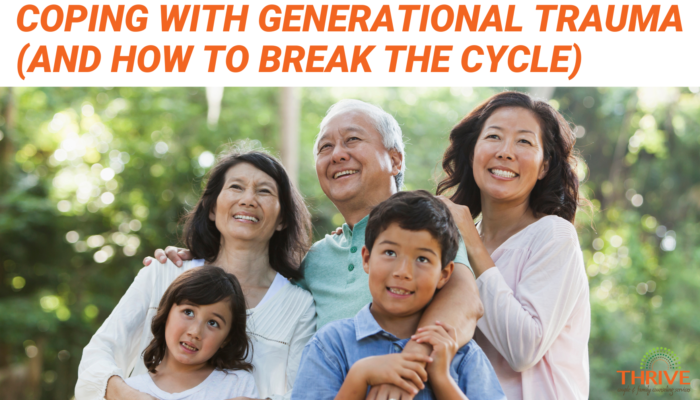Trauma and EMDR counseling has gotten more and more publicity and recognition in the last decade. Maybe your therapist told you about it, maybe a friend or family member told you about it, or maybe you heard it mentioned on a television show. Maybe you haven’t heard about it at all before now!
Regardless of your current understanding of EMDR, there is a benefit to knowing more about it. Maybe it can help you, or maybe your knowledge can be shared with someone in your life! Talking about mental health helps to reduce the stigma that we still have about mental illness in our culture.
So What is EMDR Counseling?
EMDR, or Eye Movement Desensitization and Reprocessing, is a type of therapeutic treatment aimed at alleviating the distress of traumatic memories or distressing life experiences. It is now recognized as an effective way to treat trauma by some pretty reputable organizations, including the American Psychiatric Association, the World Health Organization, and the Department of Defense. In fact, studies of EMDR have shown that it is immensely beneficial at reducing trauma symptoms in victims of a single trauma as well as victims of multiple traumas, including combat veterans. Once EMDR therapy is complete, most clients see a decline in the physiological signs of trauma, their psychological distress is relieved, and their negative beliefs as a result of trauma are reformed.
Pretty cool, right?
Victims of trauma often experience repercussions of the distressing event emotionally and mentally. It can impact their relationships, their jobs, their sleep, and so many other important parts of life. Unfortunately, trauma responses can go on for years after the traumatic event, making life (or parts of life) incredibly painful for so many people. It would be pretty relieving to know that there is an effective method of eliminating those remnants of trauma. That’s where EMDR can help.
EMDR is based on the belief that the mind can heal from emotional trauma like the body can heal from physical trauma.
Most people know that when there is a wound on the body, the body has a natural ability to be able to close and heal the injury. However, if the spot keeps getting reinjured, it takes longer to heal and you feel more pain. Protecting the wound and allowing it to heal is the best way to cover.
The same logic applies to emotional and mental injuries as a result of trauma. The way that brains work to heal is similar to the way bodies work to heal. If the brain is repeatedly exposed to the impact of a distressing event, the trauma responses continue. Even if the distressing events aren’t actually traumatic (like a war veteran having a trauma response to loud fireworks that sound like a gunshot), it can still keep the trauma from healing and lead to intense emotional suffering.
EMDR is one effective way to help the brain heal from traumatic events by activating the natural healing process that our bodies and brains want to do. EMDR attempts to transform wounds – not just close them.
So How Does It Work?
Like its name indicates, EMDR uses the client’s eye movements to diminish the power of distress from traumatic events. The EMDR therapist will use finger movements, hand or toe tapping, musical tones, or a machine to produce the eye movements in the client. Although it may sound odd at first, most EMDR therapists will allow clients to get used to the method of producing eye movements (especially if some kind of machinery is used) before officially starting treatment.
But how does a trauma victim experience reduced trauma just by moving their eyes?
First, the EMDR therapist will ask the client to think of their traumatic memory, so that it starts to be felt on an emotional or physiological level, but that the client can still tolerate. More specifically, the client will work to identify a vivid memory of the traumatic event, negative beliefs brought about by trauma, and the related emotional and physical sensations of the trauma. Then, as the client starts to process the memory and disturbing feelings, he or she will move their eyes back and forth with the therapist’s fingers, taps, or signals.
The eye movements allow the brain to reprocess the traumatic event, negative beliefs, and the emotional and physiological impacts in a way that alleviates the trauma.
This is able to happen because the eye movements that occur while remembering the trauma allows the client’s brain to activate neural networks that lead to a repairing experience. It also strengthens the neural networks associated with positive memories, emotions, and thoughts. In fact, it can be an incredibly healing experience for survivors of trauma!
If you are still confused about how this works (which is perfectly normal), it could be helpful to think about REM (rapid eye movement) sleep. While sleeping, the human body naturally moves the eyes quickly in order to help the brain process different events from the day!
In EMDR therapy, the therapist is almost recreating these same types of eye movements to help the client reprocess the traumatic event in a way that helps ease the amount of emotional distress.
How is EMDR Different Than Hypnosis?
If you’re picturing an EMDR therapy session like hypnosis, you’re not alone. The common picture for hypnosis involves a person staring at a hanging pocket watch as it sways back and forth, producing eye movements for the client that puts them in an altered state of mind. Although this might immediately sound like EMDR, they are not the same.
Hypnosis is aimed at uncovering unconscious thoughts and changing them. In pop culture, hypnosis is made to look like it is a way to make someone do or say things that they would not normally do because they are in a trance.
This is not what EMDR is. Mental relaxation is not encouraged with EMDR. In fact, clients are asked to access their trauma which can naturally produce feelings of anxiety or fear. Also, EMDR does not lead to the client losing touch with reality or go into a trance-like state of mind. Rather, the client is encouraged to stay incredibly grounded during the session.
Who Is Suitable for EMDR Counseling?
Simply put, EMDR therapy is suitable for people who are impacted by a traumatic experience such as abuse, childhood neglect, violence, war, life-threatening accidents, or other debilitating mental health diagnoses like anxiety, depression, and substance abuse.
If you have questions about your suitability (or a loved one’s suitability!) for EMDR, most therapists are happy to consult with you to answer your questions or hesitations.
How Do I Find an EMDR Counselor?
If you live in Colorado, we are happy to help you with EMDR Counseling. Call us at 303-513-8975, X1, or simply schedule a counseling appointment now:




